Charlie Hebdo attack: how should the world respond?
President Hollande may come under pressure to fight fire with fire, but the best reaction will be unity

A free daily email with the biggest news stories of the day – and the best features from TheWeek.com
You are now subscribed
Your newsletter sign-up was successful
The killing of 12 people at the offices of the French magazine Charlie Hebdo has provoked huge international outcry, as governments, news outlets and the public express solidarity with the satirical publication in the wake of the attacks. But what, if anything, should be done in response to the massacre?
Charlie Hebdo – literally "Charlie weekly" – has long been strongly anti-religious, lambasting all religions including Islam, Christianity and Judaism. The magazine's iconoclastic approach is seen by many as part of a broader French tradition for satire that stretches back to the revolution in 1789.
Charlie Hebdo was first published in 1970 and has often featured cartoons on its cover that have provoked controversy – resulting, most seriously, in the magazine's offices being firebombed in 2011.
The Week
Escape your echo chamber. Get the facts behind the news, plus analysis from multiple perspectives.

Sign up for The Week's Free Newsletters
From our morning news briefing to a weekly Good News Newsletter, get the best of The Week delivered directly to your inbox.
From our morning news briefing to a weekly Good News Newsletter, get the best of The Week delivered directly to your inbox.
In the wake of yesterday's attacks, many publications claimed solidarity with Charlie Hebdo, but writer Douglas Murray, talking to BBC said that the mainstream media's claims to stand with Charlie Hebdo were hypocritical.
"It really is all empty," Murray said. "Since 2005 when the Danish paper Jyllands-Posten published some cartoons which depicted Islam's founder Mohammed, all of the European and Western press failed to stand alongside Jyllands-Posten. None of them republished the cartoons, except for Charlie Hebdo. And now when everyone says 'we must stand with Charlie Hebdo, solidarity with Charlie Hebdo', they can't really mean it".
So should the offending cartoons be widely republished?
Today the German newspaper Berlins Grosste Zeitung splashed them in a wraparound cover with the headline "Vive la liberte". Jyllands-Posten also decided to republish the cartoons.
A free daily email with the biggest news stories of the day – and the best features from TheWeek.com
Searching for a reason for the attacks, some commentators, including former US congressman Ron Paul said that such terrorist actions could be seen as the direct result of interventionist policies taken by Western countries, including France.
But Padraig Reidy, writing for the Daily Telegraph, says that while it may be tempting to think that Islamism is related to the actions of the West, jihadist attacks are largely senseless.
"If the rise of Islamic State has taught the world one thing, it is that the provocation is beside the point. Jihadists kill because that is what they do," Reidy writes. "It does not matter if you are a French cartoonist or a Yezidi child, or an aid worker or journalist: if you are not one of the chosen few, you are fair game. Provocation is merely an excuse used by bullies to justify their actions, while ensuring the world bows to their will."
So how should the world respond to the massacre? In its editorial, The Times warned that "French nationalists will be tempted to turn this terrible attack to political advantage" and that President Hollande may come under pressure to "fight fire with fire". But the goal should not be retaliation, the paper said, but restraint and solidarity. "If France can fight it with unity instead, [President Hollande] will not have to [retaliate]. We are all Charlie now."
-
 Political cartoons for February 20
Political cartoons for February 20Cartoons Friday’s political cartoons include just the ice, winter games, and more
-
 Sepsis ‘breakthrough’: the world’s first targeted treatment?
Sepsis ‘breakthrough’: the world’s first targeted treatment?The Explainer New drug could reverse effects of sepsis, rather than trying to treat infection with antibiotics
-
 James Van Der Beek obituary: fresh-faced Dawson’s Creek star
James Van Der Beek obituary: fresh-faced Dawson’s Creek starIn The Spotlight Van Der Beek fronted one of the most successful teen dramas of the 90s – but his Dawson fame proved a double-edged sword
-
 Epstein files topple law CEO, roil UK government
Epstein files topple law CEO, roil UK governmentSpeed Read Peter Mandelson, Britain’s former ambassador to the US, is caught up in the scandal
-
 Iran and US prepare to meet after skirmishes
Iran and US prepare to meet after skirmishesSpeed Read The incident comes amid heightened tensions in the Middle East
-
 Israel retrieves final hostage’s body from Gaza
Israel retrieves final hostage’s body from GazaSpeed Read The 24-year-old police officer was killed during the initial Hamas attack
-
 China’s Xi targets top general in growing purge
China’s Xi targets top general in growing purgeSpeed Read Zhang Youxia is being investigated over ‘grave violations’ of the law
-
 Panama and Canada are negotiating over a crucial copper mine
Panama and Canada are negotiating over a crucial copper mineIn the Spotlight Panama is set to make a final decision on the mine this summer
-
 Why Greenland’s natural resources are nearly impossible to mine
Why Greenland’s natural resources are nearly impossible to mineThe Explainer The country’s natural landscape makes the task extremely difficult
-
 Iran cuts internet as protests escalate
Iran cuts internet as protests escalateSpeed Reada Government buildings across the country have been set on fire
-
 US nabs ‘shadow’ tanker claimed by Russia
US nabs ‘shadow’ tanker claimed by RussiaSpeed Read The ship was one of two vessels seized by the US military